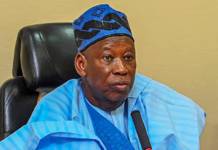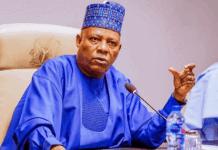Socio-Economic Rights and Accountability Project (SERAP) has urged the nine oil producing states in Nigeria to “provide and widely publish details of spending of the oil derivation refunds of N625bn recently paid to them by the Federal Government, including details and locations of projects executed with the money.”
The Federal Government recently paid N625.43 billion oil derivation refunds to the governors of Abia, Akwa Ibom, Bayelsa, Delta, Edo, Rivers, Ondo, Imo and Cross River states. The payments covered 13 per cent oil derivation, subsidy and SURE-P refunds. The refunds date from 1999 to 2021.
In the open letter dated 10 December 2022 and signed by SERAP deputy director Kolawole Oluwadare, the organisation said: “It is in the public interest to publish the details of spending of the refunds. Nigerians have the right to know how their states are spending the refunds. It is part of their legally enforceable human rights”
SERAP said, “Disclosing the information would enable Nigerians to scrutinise the spending of the refunds. Publishing the details of the oil derivation refunds would also promote transparency and accountability in the spending of public funds.”
The letter, read in part: “Widely publishing details of the spending of the oil derivation refunds would ensure that persons with public responsibilities are answerable to the people for the performance of their duties in the management of public funds.”
“We would be grateful if the recommended measures are taken within seven days of the receipt and/or publication of this letter. If we have not heard from you by then, SERAP shall take all appropriate legal actions to compel you and your state to comply with our request in the public interest.”
“The public interest in obtaining the information about expenditures relating to the oil derivation refunds outweighs any privacy or other interests. The oversight afforded by public access to such details would serve as an important check on the activities of your state and help to prevent abuses of the public trust.”
“SERAP also urges you to disclose details of spending of the refunds to local government councils through the state accounts, and to explain the role played by your government in the spending of public funds meant for the councils.”
“The constitutional principle of democracy also provides a foundation for Nigerians’ right to know details of spending of the oil derivation refunds. Citizens’ right to know promotes openness, transparency, and accountability that is in turn crucial for the country’s democratic order.”
“The effective operation of representative democracy depends on the people being able to scrutinise, discuss and contribute to government decision making, including on the spending of the oil derivation refunds.”
“To do this, they need information to enable them to participate more effectively in the management of public funds by their state governments.”
“The Freedom of Information Act, Section 39 of the Nigerian Constitution, article 9 of the African Charter on Human and Peoples’ Rights and article 19 of the International Covenant on Civil and Political Rights guarantee to everyone the right to information, including about how the oil derivation refunds are spent.
“By the combined reading of the provisions of the Constitution of Nigeria, the Freedom of Information Act 2011, and the African Charter on Human and Peoples’ Rights, applicable throughout Nigeria, there are transparency obligations imposed on your state to publish details of spending of the oil derivation refunds.”
“The Nigerian Constitution, Freedom of Information Act, and the country’s anti-corruption and human rights obligations rest on the principle that citizens should have access to information regarding their government’s activities.”
“Your state cannot hide under the excuse that the Freedom of Information Act is not applicable to your state to refuse to provide the details being sought, as your state also has clear legal obligations to provide the information as prescribed by the provisions of the Nigerian Constitution, and the African Charter on Human and Peoples’ Rights (Ratification and. Enforcement) Act.”
“SERAP urges you to invite the Economic and Financial Crimes Commission (EFCC) and the Independent Corrupt Practices and Other Related Offences Commission (ICPC) to jointly track and monitor the spending of the oil derivation refunds by your state.”
“SERAP also urges you to provide details of the transparency and accountability mechanisms that have been put in place to ensure that the derivation refunds are not mismanaged, diverted or re-stolen.”
“According to our information, under the 13 per cent derivation fund, Abia State received N4.8 billion; Akwa-Ibom received N128 billion; and Bayelsa got N92.2 billion. Cross River got a refund of N1.3 billion; Delta State received N110 billion; Edo State received N11.3billion; Imo State, N5.5 billion, Ondo State, N19.4 billion; and Rivers State received 103.6 billion.”
“On the 13 per cent derivation fund on deductions made by NNPC, Abia State received N1.1 billion; Akwa-Ibom, N15 billion; Bayelsa, N11.6 billion; Cross River, N432 million; Delta State, N14.8 billion; Edo State, N2.2 billion; and Imo State, N2.9, billion. Ondo State, got N3.7 billion while N12.8 billion was paid to Rivers State.”
“The nine states also received N4.7 billion each, totalling N42.34 billion as refunds on withdrawals for subsidy and SURE-P from 2009 to 2015. The Federation Account also paid N3.52billion each as refund to local government councils on withdrawals for subsidy and SURE-P from 2009 to 2015.”

























